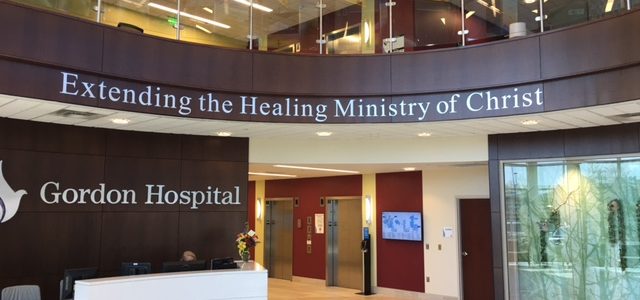Denny DeSimone, who doesn’t consider herself to be a religious person, had to get used to faith in the workplace when she began working at Gordon Hospital in Calhoun.
The hospital is managed by the Adventist Health System and follows many principles of the Seventh-Day Adventist Church. The church has always encouraged healthy lifestyles, including a generally vegetarian diet and abstinence from alcohol and tobacco.
At the hospital, vegan and vegetarian food options are always served, a chaplain is on site during weekdays, and prayer at the end of meetings is normal.
That doesn’t bother DeSimone, a patient care advocate at the northwest Georgia facility.
“If you are not religious, such as myself, you do not have to participate,” she said. “I usually bow my head and remain silent as a sign of respect for others’ religious beliefs.”
In 2016, more than 700 U.S. hospitals were owned by religious organizations. Such facilities often have employees and patients that follow other faiths or are not religious. While employees can opt out of their workplace’s religious practices, some advocacy groups worry that patients may not always have that choice.
It’s particularly problematic as faith-based hospitals expand to fill a void, as in rural areas where access is limited.
For example, almost a third of Catholic hospitals are in rural areas, according to MergerWatch, an organization that works with communities to protect patients’ rights and access to care when religious health systems propose a hospital merger.
The ethical guidelines of Catholic hospitals may prohibit procedures such as abortions, infertility services, contraception and vasectomies, the MergerWatch report notes. (The Catholic Church opposes abortion and any artificial means of preventing pregnancy.)
“In many places where there are no other hospitals, people cannot get the care they need,” said the Rev. Marie Alford-Harkey, a pastor of the Metropolitan Community Churches and president of the Religious Institute, a multi-faith organization that advocates for sexual, gender and reproductive health.
Hospital groups say patients always get evidence-based care, no matter what the company’s faith.
“Some hospitals might be owned by a religious-affiliated entity, but they’re still governed by state and federal regulations,” said Jeff Sunderland, the senior director of communications at the Georgia Hospital Association, which includes more than 170-member hospitals statewide.
Emily Webb is graduate student in the health and medical journalism program. Her full story on faith-based hospitals is posted on Georgia Health News.

